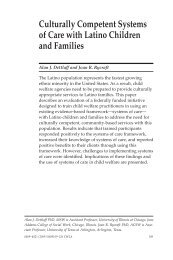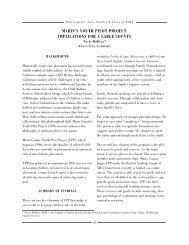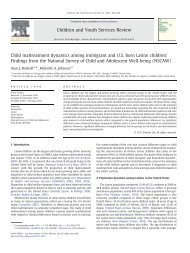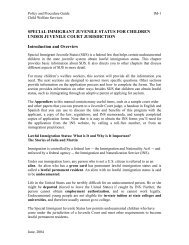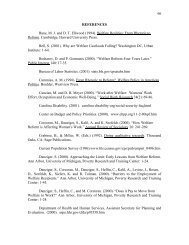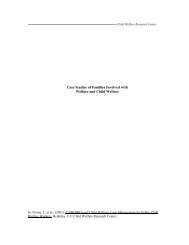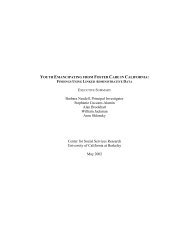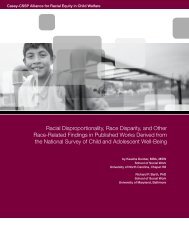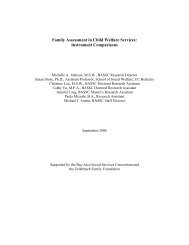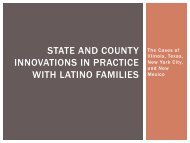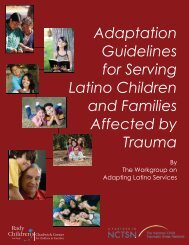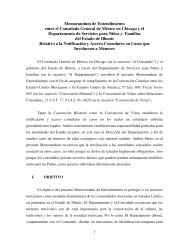Appendix GCLAS in MCOs Study Data Collection Plan1. DATA COLLECTION DESIGN CONSIDERATIONS1.1 Identifying Appropriate RespondentsAn important component <strong>of</strong> the study’s data collection plan was to determine who, i.e.,which MCO staff types, would be most appropriate for answering questions related to the studydomains and key elements. Brainstorming exercises were conducted, and extensivedeliberations were held among the research team, OMH staff, and the experts from the field toexamine the domains and key elements in terms <strong>of</strong> the types <strong>of</strong> respondents who would beknowledgeable <strong>of</strong>, and therefore able to answer questions related to, particular areas <strong>of</strong> inquiry.An examination <strong>of</strong> the domains, key elements, and study variables revealed a clearconceptual division, or categorization <strong>of</strong> topical inquiries, to be paired with respondent typeswho would be appropriate for gathering the needed information. The conceptual framework wasstudied and discussed at length, both in its entirety and within each domain. Through thesediscussions, the following pattern <strong>of</strong> topical inquiries emerged: the framework was found tocomprise measures <strong>of</strong> CLAS practices as they relate to: 1) the organization; 2) its staff; and3) its members. As such, these discussions resulted in a three-tiered approach for collecting datawithin each MCO. One respondent would be responsible for completing a questionnairecomponent that covered each <strong>of</strong> these three main areas <strong>of</strong> inquiry, so that three respondents perMCO would participate in the study’s data collection effort.Questions related to CLAS practices at the organization level (e.g., CLAS-related corporateplanning and policy development) should be directed toward a senior executive within theorganization, such as a Chief Executive <strong>Office</strong>r (CEO) or Medical Director. This decision toidentify and approach an MCO’s senior executive for the organization-related topics <strong>of</strong> inquirywas strengthened by the fact that the American Association <strong>of</strong> Health Plans (AAHP) managedcare directory, that would be used as the study’s sampling frame maintained by the AmericanAssociation <strong>of</strong> Health Plans (AAHP) included contact information for each organization’s CEOor Medical Director.An important consideration was <strong>of</strong>fered by members <strong>of</strong> the expert panel regarding the level<strong>of</strong> variation among MCOs and their staffing patterns. Because organizations vary by size andfunction, identifying the two remaining respondents within each MCO may prove to be morecomplicated. As such, the panelists recommended that appropriate respondents for completingthe questionnaire components covering staff- and member-related CLAS practices be identifiedby someone within the organization such as a high-level executive.Also, it was recommended that the appropriate respondents for completing the staff- andmember-related components <strong>of</strong> the instrument be based on function and knowledge, not title orCOSMOS Corporation, December 2003 G-1
position, as titles will likely vary by organization. Therefore, the research team, OMH staff, andthe advisory groups agreed that these two respondent types would be described very broadly as“staffing respondents” and “membership respondents.” The individuals within each organizationwould be identified by the senior executive based on individuals’ roles, responsibilities, andknowledge that best suit the topical nature <strong>of</strong> each staff- and member-related questionnairecomponent.1.2 Designing a Three-Component QuestionnaireA three-component instrument was developed to be administered to the three respondentswithin each MCO: a Senior Executive Telephone Interview Protocol (see Appendix C); aStaffing Questionnaire (see Appendix D); and a Membership Questionnaire (see Appendix E).The Senior Executive Telephone Interview Protocol was designed to be brief in order toaccommodate the busy schedules <strong>of</strong> executive respondents. Therefore, the majority <strong>of</strong> surveyitems were to be included in the Staffing and Membership Questionnaires. As indicated, itemsrelated to organizational governance (Domain 1) and CLAS-related corporate policies (Domain2) are located in the Senior Executive Telephone Interview Protocol. Questionnaire items relatedto staffing patterns (Domain 6), staff training (Domain 7), and patient assessment and treatmentservices (Domain 3) are found in the Staffing Questionnaire. The Membership Questionnaireincludes items related to translation and interpretation services (Domain 8), and the health careenvironment (Domain 3). Information about Management Information Systems (Domain 5) isasked in both the Staffing and Membership Questionnaires, and questions about CLAS-relatedquality monitoring and improvement efforts (Domain 4) are included in all three components.1.3 Selecting an Appropriate Study Universe and Sampling StrategyBecause this study involves data collection from a sample <strong>of</strong> MCOs, or health plans, themost appropriate sampling frame was identified as the directory maintained by AAHP. AAHPrepresents approximately 1,000 health plans which cover about 170 million individuals in theU.S.The Association was created in 1995 through a merger <strong>of</strong> the Group Health Association <strong>of</strong>America and the American Managed Care and Review Association. AAHP’s mission is toadvance health care quality and affordability through leadership in the health care community,advocacy and the provision <strong>of</strong> services to member health plans. AAHP provides a wide range <strong>of</strong>services to its members, including: federal- and state-level advocacy within regulatory agencies,a strategic communications program, quality assessment and improvement programs, publicpolicy and research, and educational programs (e.g., the <strong>Minority</strong> Management Training andOutreach Program) on the latest developments in managed care.At the time <strong>of</strong> sample selection (i.e., February 2002), the 2001 edition <strong>of</strong> the AAHPDirectory <strong>of</strong> Health Plans <strong>of</strong>fered the most current and complete coverage <strong>of</strong> MCOs nationwideand included a total listing <strong>of</strong> 904 organizations. The directory identifies metropolitan marketCOSMOS Corporation, December 2003 G-2
- Page 1 and 2:
Developing a Self-Assessment Toolfo
- Page 3 and 4:
ContentsChaptersPage1. Introduction
- Page 5 and 6:
Chapter 1Introduction
- Page 7 and 8:
While many LPHAs currently provide
- Page 9 and 10:
LPHAs include: adult and child immu
- Page 11 and 12:
Professions Education Partnership A
- Page 13 and 14:
Chapter 2Methodology for Developing
- Page 15 and 16:
Public Health Practice Program Offi
- Page 17 and 18:
assess their own beliefs and have k
- Page 19 and 20:
communicate with, and clearly under
- Page 21 and 22:
2.1.6 Identifying Key Components of
- Page 23 and 24:
Given these persistent disparities
- Page 25 and 26:
(Exhibit 2-2, Continued)DOMAIN / KE
- Page 27 and 28:
limited to the actual clinical enco
- Page 29 and 30:
Chapter 3Project Results and Recomm
- Page 31 and 32:
local board of health. PEP and PAG
- Page 33 and 34:
numerous promising CLAS practices a
- Page 35 and 36:
References
- Page 37 and 38:
Becker, M.H., and L.A. Maiman, “S
- Page 39 and 40:
Frye, B., “Health Care Decision M
- Page 41 and 42:
Marin, G., “Defining Culturally A
- Page 43 and 44:
Perkins, Jane, “Overcoming Langua
- Page 45 and 46:
U.S. Bureau of the Census, “Censu
- Page 47 and 48:
Appendix AMembership Lists of the P
- Page 49 and 50:
Appendix A-1Developing a Self-Asses
- Page 51 and 52:
Appendix A-2Developing a Self-Asses
- Page 53 and 54:
Appendix B-1Overview of Eight CLAS
- Page 55 and 56:
Domain 3: Culturally Inclusive Heal
- Page 57 and 58:
understanding of diversity issues i
- Page 59 and 60:
Appendix B-2Conceptual Framework fo
- Page 61 and 62: Appendix CLPHA Director or Designee
- Page 63 and 64: Pre-Interview Script for LPHA Direc
- Page 65 and 66: 3b. Which of the following are refl
- Page 67 and 68: 6. Does your agency have a formal p
- Page 69 and 70: 10. Which of the following describe
- Page 71 and 72: Post-Interview Script for LPHA Dire
- Page 73 and 74: Appendix DStaffing Questionnaire
- Page 75 and 76: A. QUALITY MONITORING AND IMPROVEME
- Page 77 and 78: B. MANAGEMENT INFORMATION SYSTEMS (
- Page 79 and 80: 7. Please indicate, if you know, th
- Page 81 and 82: 1c. Please indicate for which categ
- Page 83 and 84: 6. Please indicate for which catego
- Page 85 and 86: 10. Which of the following topical
- Page 87 and 88: 17. Which of the following benefits
- Page 89 and 90: 4. Which of the following strategie
- Page 91 and 92: Appendix EClient Services Questionn
- Page 93 and 94: A. QUALITY MONITORING AND IMPROVEME
- Page 95 and 96: 6b.Which of the following community
- Page 97 and 98: 3. Please report or estimate what p
- Page 99 and 100: 3. Which of the following practices
- Page 101 and 102: Oral Interpretation Services10. Whi
- Page 103 and 104: 16. At which of the following key e
- Page 105 and 106: 3. Which of the following kinds of
- Page 107 and 108: Appendix FPilot Test Response Form
- Page 109 and 110: RESPONDENT EVALUATIONOF THE QUESTIO
- Page 111: Appendix GCLAS in MCOs Study Data C
- Page 115 and 116: complex and uncertain at the time t
- Page 117 and 118: 1. Incorporate a confirmation pre-c
- Page 119 and 120: Exhibit 2DATA COLLECTION PROCESSSen



